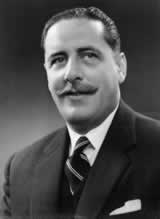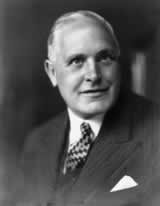|
FRANCIS GERARD [FG] MOORHOUSE
(1910-1984)
 |
To see an enlargement of
any photograph click on the picture. The highlighted links will
also give you pictures, just close the temporary window afterwards to
continue on the page.
F.G. Father and Managing Director
by
Peter Moorhouse [son of F.G. Moorhouse]
The majority of the employees of Wm. Moorhouse & Sons, particularly
the sales force, will, I suspect, have seen F.G. as a somewhat larger
than life figure.
|
 |
He was by nature a salesman himself and therefore
identified very closely with the sales side of the business and the salesmen
in particular. On business occasions he could be a superb public speaker,
very emotive and motivational. At sales conferences he favoured the "Churchillian
style". I recall a sales conference at the Griffin Hotel, Leeds at a
time when the industry was suffering a severe bout of price cutting due
the actions of The St. Martin Preserving Co. F.G. was not about to sell
jam at a loss and refused to reduce prices. In his final speech to the
conference he took the quotation from Henry V "He
which hath no stomach to this fight, let him depart" - you could have heard a pin drop
until the end when 120 salesmen roared their approval.
|
 |
To the family I suspect he could be a difficult man
to work with. I was having dinner with him in London after we had become
part of Schweppes and we were talking about the more committee style
of management within Schweppes. He thought for a moment and said "I
have no problem with management by committee as long as it is a committee
of two and the other bloke is away ill".
|
 |
He was totally committed to the Company
and for most of his life had few if any, other interests. After supporting
Leeds United for some years he became a director of the club and continued
this interest until not long after the Company was sold to Schweppes.
Again over dinner in London he said to me "I
am going to resign from the board of Leeds United, it's reached the point
where on Thursday I start worrying about the team that the manager will
pick, on Friday I worry about how they will perform, on Saturday I watch
them perform, on Sunday I think about the game and read the newspaper
reports, on Monday I think about what I am going to say at the Board
meeting, on Tuesday I worry about whether I said too much. Wednesday
I have off!"
Unfortunately
he never learned to relax. |
 |
Few outside the family will know that he suffered
from what is now called "clinical depression" then known as having a "nervous
breakdown". To my knowledge he had bouts of depression which necessitated
medical treatment in 1947/48, the mid-fifties and in 1963 the last of
which resulted in his departure from Schweppes. Thereafter he was in
a semi permanent state of depression.
He was born in August 1910 in Southport, where his father,
Charles worked for Fattorini's as a jeweller/clockmaker. Sadly Charles
died in 1917 and the family, Fanny, Charles' widow, Winifred, Frank (F.G.)
and Dorothy returned to Leeds where the majority of Charles brothers
had by men moved.
There is no doubt that life was not easy for the family
but Joe and Baldisaro, both bachelors, did much to ensure that Fanny
and her children were not left in want. Not withstanding the generosity
of her brothers-in-law Fanny had to take in lodgers and washing in order
to make ends meet. |
 |
F.G. was sure that he would die around about the same
age as his father and therefore was driven by that thought to make sure
that his family would not be in the same situation as he and his mother
and sisters had been. So sure was of this that he that he made over a
significant proportion of his ordinary shares in Wm. Moorhouse & Sons
to myself and my brother in order to avoid death duties. He continued
for the rest of his life to be extremely generous, perhaps too generous
since he had no pension from Wm M&S or Schweppes and no severance
package from Schweppes when he retired due to ill health.
Apropos the question of ordinary shares in the company,
the Articles of Association were altered in the 1950's to bar female
members of the family from owning ordinary shares. This was a somewhat
belated attempt to prevent dilution of the family control through marriage.
It is perhaps a reflection of the times that none of
the female members of the family worked on a career basis within the
family business. |
 |
The only time that the family came anywhere
near losing control was after the death of Joe in 1950. He was a bachelor
and had not made provision for Death Duties (Inheritance tax). The family
were therefore faced with a substantial bill but since the shares were
held privately there was no market for them, in any case a sale on the
scale required would have resulted in the family losing control. However
after World War 2 the clearing banks set up an organisation called The
Industrial and Commercial Finance Corporation (ICFC). The purpose of
this organisation was to provide finance to privately owned companies
in such a way that equity control was not lost to the owners. Thus ICFC
provided a loan, secured by a debenture in the company, with which the
Death Duties were paid. The loan was repaid ahead of time and the debenture
was released.
|
 |
In 1950 with the death of
Joe Moorhouse, who had been Managing Director and Chairman of William
Moorhouse & Sons, F.G. Moorhouse (Charles'
son) became Managing Director and Ted
Moorhouse became Chairman.
Ted gracefully resigned as Chairman to make it easier
for FG as Chairman and MD to negotiate the sale of Moorhouses
to Schweppes in 1959. |
 |
   
|
| |
|
| <Biographies |
|
| |
|
| |
|
| |
|
| |
|
|
|
Biographies/Francis
Gerard Moorhouse
|

